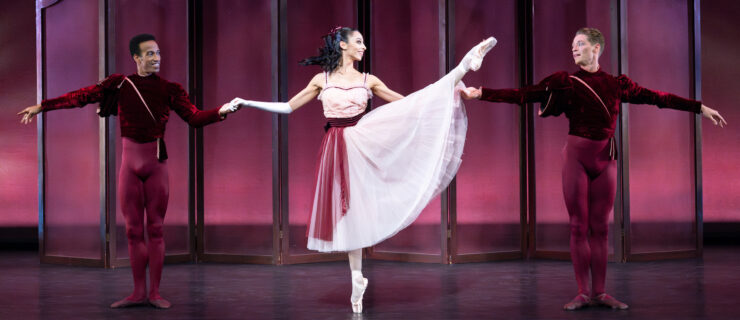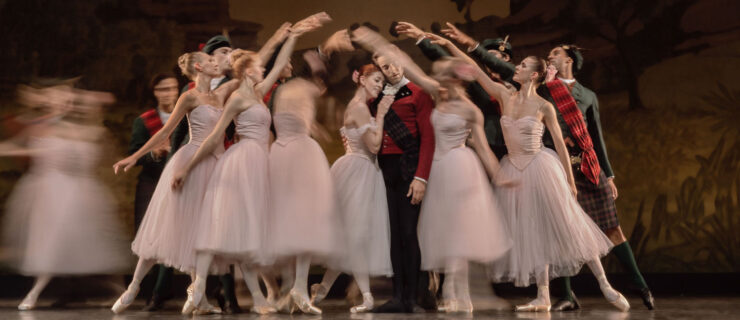Director's Notes: Unafraid to Explore
Louis Robitaille has put BJM Danse Montréal at theforefront of all that’s edgy and cool in contemporary ballet.
Athletic, versatile and physically beautiful, the dancers of BJM Danse Montréal, formerly Les Ballets Jazz de Montréal, have dazzled audiences worldwide for more than 35 years. Yet there was a time when the troupe fought to be taken seriously. High-minded critics and dance purists claimed it was too ingratiatingly accessible, relying on the dancers’ easy-on-the-eye sexiness to compensate for a lack of choreographic muscle.
Not anymore. The dancers are still electric, but now the choreography commands equal respect. BJM Danse is an intensely creative, even experimental company, attracting a number of today’s hottest choreographers, including Crystal Pite, Aszure Barton, Mauro Bigonzetti and Rodrigo Pederneiras.
Much of the credit for this evolution goes to Louis Robitaille, who has served as BJM’s artistic director for the past 12 years. Once the iconic prince of French-Canadian avant-garde ballet, Robitaille has come full circle in his career: He began dancing in the school of Les Ballets Jazz. On graduation he joined Montreal’s popular Compagnie de Danse Eddy Toussaint and quickly emerged as the troupe’s idolized male star. He later joined Les Grands Ballets Canadiens and was a keen participant in company choreographic workshops, leading to Bande à Part, a troupe dedicated to fostering choreographers. He also founded the short-lived Danse-Théâtre de Montréal, again to cultivate choreographic innovation.
It was an apt apprenticeship for what followed: assuming leadership of BJM when it needed a fresh vision. Critic Linde Howe-Beck says Robitaille “totally retooled the company from its name on up, making it hip and smart.”
In its first couple of decades the company was driven by jazz music, but for Robitaille, BJM is about much more. “I’m directing a dance company,” he emphasizes. “Les Ballets Jazz made big waves in the ’70s and ’80s. I respect our heritage, the public expectation for energy, joy, personality and physicality. But this is a new era. We work now with different music and a new generation of choreographers because they are the evolution of dance.”
Robitaille hires dancers to match. He looks for strong classical technique and a suitable physique—harmonious proportions, good feet and elegant lines—but, because of the demands of the choreography, Robitaille says extreme versatility and creative instincts are crucial. “We need dancers with diverse training: modern, jazz, even street dance. We look for theatrical skills and for dancers who are comfortable with improvisation. The men should look like men, strong and tall, with good partnering ability.”
The company currently consists of six men and six women. Ideally, Robitaille says he’d like to have 16 dancers, but with a modest annual budget of about $2 million (in Canadian dollars) he has to set priorities. At present, these are to pay the dancers a decent wage and give them intersting work to perform. “We need very good artists and for that we need to be competitive to attract and keep them.”
BJM’s dancers, though not unionized, do have a collective agreement. They are not hierarchically ranked. Weekly pay, based on experience and seniority, ranges from 650 to 750 Canadian dollars. “It’s not the greatest,” concedes Robitaille, pointing out, however, that BJM’s season offers from 40 to 44 paid weeks a year and that living costs in Montréal are low (“It’s possible to rent a comfortable apartment for $650 a month”). The company also tours widely across North America, South America, Europe and Asia.
Two-thirds of the company members on the 2009–10 season roster are new—an unusually high turnover. Robitaille says some of the dancers who left were simply “not the right fit,” while others opted for a change—sometimes because they wanted to work more intensively with one of the cutting-edge choreographers BJM had commissioned. “Today’s dancers want more than ever to explore, experiment and travel. It’s the reality. They must live their dreams.”
At A Glance:
BJM Danse Montréal
Contract: 40 to 44 weeks
Company members: 12–14
Salary: CDN$650–$750 per week
Website: www.bjmdanse.ca





